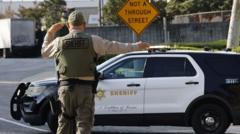Amid ongoing political tensions, Donald Trump's latest accusations against Barack Obama are met with sharp rebuttals, prompting discussions on election integrity and national security.
Trump's 'Treason' Accusation Against Obama Sparks Outrage

Trump's 'Treason' Accusation Against Obama Sparks Outrage
Former President Barack Obama responds to Trump's claims of treason, defending the integrity of intelligence findings.
In a recent press conference at the White House, former President Donald Trump made headlines by accusing former President Barack Obama of "treason." This allegation centers around claims that Obama plotted to sabotage Trump’s presidency by connecting him with supposed Russian interference during the 2016 election. “They tried to steal the election,” Trump asserted, alleging that Obama sought to undermine his victory over Hillary Clinton.
Obama's spokesperson, Patrick Rodenbush, delivered a rare response to Trump’s outburst, labeling the accusations as “bizarre” and a “weak attempt at distraction.” The remarks were reportedly triggered by a recent report from US Director of National Intelligence Tulsi Gabbard, which claimed that Obama and his security team engaged in a "years-long coup" against Trump—claims Democrats have dismissed as false.
Trump's outburst came during a time of heightened scrutiny surrounding his administration regarding the late Jeffrey Epstein, a convicted sex offender. He has been under pressure to disclose more information related to the infamous figure who died in prison in 2019 while awaiting trial.
While hosting Philippine President Ferdinand Marcos Jr in the Oval Office, Trump reiterated his accusations against Obama, implying that the previous president was "guilty" of treasonous conduct. The controversy finds its roots in a report published last week that included declassified emails from Obama’s aides, which suggested they suppressed intelligence findings asserting that Russia did not impact the election results through cyber activities.
The declassified documents from a presidential daily briefing following Trump's victory indicated that US intelligence assessed that Russia did not manipulate votes during the election. However, after a dissenting view was raised by the FBI, a meeting was convened with senior officials, which led to further evaluations being requested.
Gabbard claimed the declassified information substantiates a "treasonous conspiracy" aimed at harming Trump, threatening to refer Obama administration officials to the Department of Justice. In rebuttal, Obama’s spokesperson emphasized the consensus regarding Russia's attempts to influence the election, yet noted that these efforts did not translate into successful manipulation of voting outcomes.
Reports from US intelligence as early as January 2017 concluded that Russia aimed to damage Clinton's campaign and support Trump’s candidacy. While there was acknowledgment of attempts, including social media manipulation and email hacks, assessments concluded that these actions likely had a limited effect on the overall election result.
The matter of Russian interference has loomed large over Trump's early presidency, with the Mueller Report ultimately finding no evidence of Trump or his campaign colluding with Russia. Subsequent inquiries have brought into question the validity of the original FBI investigation, suggesting it lacked thorough analytical methods.




















